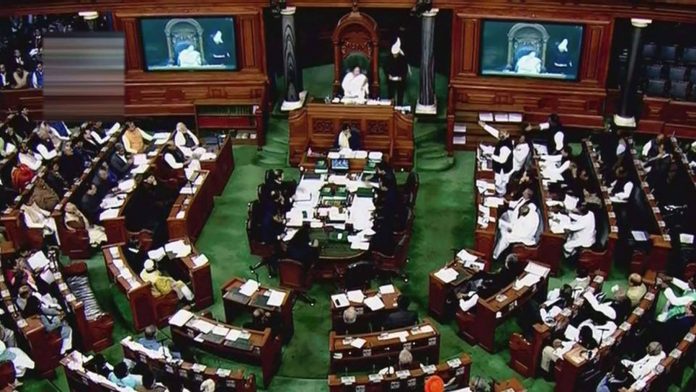This article has been written by Hera Nafis.
Table of Contents
Introduction
The socio-political and economic conditions of the country, at this juncture, is a harbinger of 0irregularity and lapses in the response of the government to the matters of national importance India is witnessing an unprecedented economic slowdown, diplomatic relation seems to be failing with China’s orchestrated aggression towards Indian territory and the COVID-19 cases have breached the 5 million mark. Antithetical to the collective expectation of the nation to gain an insight as to the preparedness and responses of the government, the Lok Sabha Secretariat and Rajya Sabha Secretariat vide respective Notifications, dispensed away with the Question Hour, save and except the unstarred questions (as explained hereinafter) and introduction of Private Member’s bill during the Monsoon session of the parliament, which began on 14th September 2020 and will end on 1st October 2020 (“Monsoon Session”). It is equally critical to note that due to the adjournment of the 3rd Session of 17th Lok Sabha on 23 March, 2020, the questions listed for oral and written answers from 24th March to 27th March, 2020, also lapsed.
What is Question Hour?
In terms of Rule 32 of the Rules of Procedure and Conduct of Business in Lok Sabha (“Rules”), the first hour of every sitting of the parliament which is dedicated to elicit answers from the ministers, with the concurrence of the Speaker, is generally referred to as the Question Hour. The idea of Question Hour is rooted in the parliamentary practice of the United Kingdom, which has metamorphosed in the Indian context to be a democratic tool and the right of the members to ask questions from the government on crucial aspects of administration, its activities and as an enabler to bring issues to the fora that holds national and international significance.
Significance of the Question Hour: A functional aspect of the parliamentary democracy
Question Hour assumes critical importance in the parliamentary proceedings and adorns a character that is significantly different from the other proceedings of the parliament, including motions, resolutions and discussions. In other proceedings, it is not incumbent upon the Minister(s) to specifically respond to the concerns/questions of the member, however in relation to the Question Hour, the Minister and the member, as the case may be, is under an obligation to specifically respond to the question posed.
The very nature of the Question Hour is a testament to the democratic values of the nation as it bestows upon the representatives of the people, an inherent and unfettered parliamentary right to ask questions from the government. It is to be noted that the criticality of the Question Hour is also reiterated on the official website of the Lok Sabha and Rajya Sabha respectively. It states that the Question Hour provides the institution of Parliament, the great significant that it possesses. Further, elucidating upon the significance of the Question Hour, it states that Government policies in national as well as international spheres come into sharp focus as the members try to elicit pertinent information during the Question Hour.
Further, Shri R.K. Sidhwa, in one of the constituent assembly debates, stressed upon the significance of the Question Hour as it empowers the members to get information from the ministers, for which they are collectively and severally answerable to the legislature.
Given the significance that Question Hour holds, it is also telecasted live. Primarily, the Question Hour serves three purposes, a) it enables the members to gain information and response of the government on critical issues of national and international significance, b) provides a systematic review of the workings of the policies of the government on the ground level, and c) lays bare the commitment of the representatives of the people towards the issues of their constituency and nation at large.
Thus, Question Hour is indeed a personification of parliamentary democracy, where the executive is held accountable to the representatives of the people. It would be rather a unique proposition if in a parliamentary democracy like India, no questions are allowed.
Unlock 4 and termination of Question Hour: A dichotomy?
The Question Hour in the Monsoon Session of the parliament is terminated on the grounds of an existing public health emergency, being COVID-19. It is important to note that the overall working hours of the Monsoon Session remains the same with the introduction of a few structural changes in the conduct of the said session. The Government of India had introduced a series of lockdown, beginning from the latter half of the March 2020, as COVID-19 transmission control measure. However, beginning from 30 th May 2020, the Government has introduced several guidelines to gradually move towards phased ‘Re-opening’.
Currently, the Ministry of Home Affairs, vide Order dated, 29 th August 2020, issued, “Guidelines for Phased Re-opening (Unlock 4)”, which introduces several relaxation measures including inter-state, intra-state movement and re-opening of public and private facilities. Further, the Government has also televised certain advertisements to encourage people to resume work with basic precautions.
Thus, at the root of it, the response of the Government towards COVID-19 and the termination of solely Question Hour in the Monsoon Session on grounds of COVID-19 seems amiss.
A lackadaisical approach towards redressal: Need for an alternative
There is a larger question that needs introspection and deliberation, which is whether terminating the oral session of the Question Hour, in its entirety, is justifiable given the current exigencies. At the outset of the Monsoon Session, the government has failed to present any data on the death of migrant labours and the healthcare workers that are attributable to COVID-19. Further, the farmers have been agitating in the north-western parts of India and there is an opacity on the utilisation of PM CARES Fund.
At his juncture, it is critical to note that the Speaker has the residuary powers in terms of deciding the manner in which the Question Hour may be conducted and the matters related thereto. Thus, owing to the exigencies at hand, an alternate, least intrusive approach and methodology, such as the feasibility of digital Question Hour, shall have been explored by the Government. COVID-19 has brought about a tectonic shift in digitising the workplaces, justice delivery system, educational institutions and other crucial aspects of life. In this scenario, the feasibility of providing a digital platform for the conduct of Question Hour should have been explored.
In the absence of a visible effort on exploring alternate arrangement(s) for conducting Question Hour, the genuinity of the ground for termination of the Monsoon Session remains clouded.
Conclusion
It is for the first time that the Question Hour has been terminated in an ordinary session of the Parliament. On earlier four occasions, last being in the year 1977, when the Question Hour was terminated, the session was called for a specific purpose. The Question Hour holds significant importance in the Indian parliamentary history, where it has exposed layered scams of the then ruling Government and has also led to a series of investigatory and reformative measures. The Question Hour is a functional aspect of the parliamentary democracy and it is the need of the hour that critical statistics inter alia like the death of the migrant workers and healthcare workers owing to COVID 19 are not wiped from the institutional memory. Further, it is important that critical issues like the development stage of the potential COVID vaccine, utilisation of PM CARES Fund, clarity on the agricultural bills and the roadmap for the revival of the economy is addressed by the Government in an effective and a transparent manner. Thus, the Government should explore an alternate digital possibility or like a medium of facilitating Question Hour.
LawSikho has created a telegram group for exchanging legal knowledge, referrals and various opportunities. You can click on this link and join:
 Serato DJ Crack 2025Serato DJ PRO Crack
Serato DJ Crack 2025Serato DJ PRO Crack











 Allow notifications
Allow notifications


